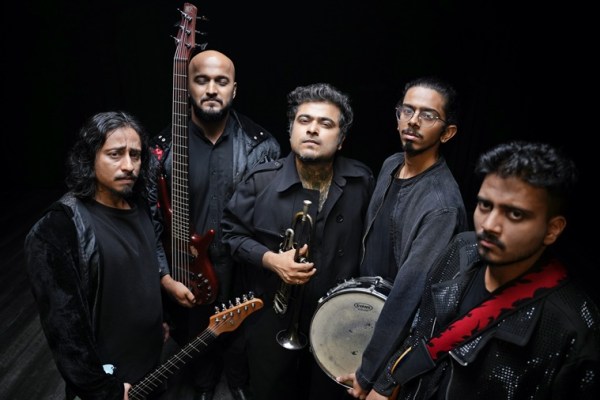‘Jadoo Bastar’: A new fusion rock-folk album hopes to showcase the magic of Chhattisgarh
Bailadila is a mountain range in Chhattisgarh’s Dantewada, which has been the epicentre of the state’s Naxalism insurgency for long. Amid the gruesome stories of violence from the area, what’s not often spoken of, especially in popular culture, is the natural beauty of the dense forests, the beautiful landscape and the magnificent waterfalls of the Dandakaranya jungle. But like all folk music, including Bastar’s folk music that derives its identity from its tribal communities, it has kept alive the reverence for the local landscape, such as the Indravati river that feeds the region.
‘Bailadila’ is now also the title of a new folk-rock song that speaks of the captivating magic that Bastar holds and has been released by the Mumbai-based art rock band, Daira, in collaboration with Chhattisgarh’s musicians who sing in the local tribal language Halbi and Hindi. The song was released in July and is part of the five-song album called ‘Jadoo Bastar’.

The project hopes to establish harmony between the musical styles of the folk artists of Bastar and Daira. The tribal languages Halbi and Gondi, as well as their traditional music, have been combined with Daira’s rock sensibilities. An hour-long documentary also showcased what went into the collaboration behind the scenes.
It all began in 2022 when Daira performed a live show in Bastar. Lakheshwar Khudaram, a Bastar-based musician who participated in the album, was at the concert. He described the event as “magic and nothing short of a miracle”. “It was a new experience to see something of that scale. Everything that went into their show was precise and technical, the musical instruments looked different, and there was a longing within me to perform with them,” he said.
Khudaram first met Daira in 2022, at a three-day workshop that the band held at the Bastar Academy of Dance, Art & Literature (BADAL) before their performance, which was at the invitation of the Bastar District Magistrate. “Since the region has been associated with violence for long, the administration established BADAL to offer the local youth an avenue to the arts and to express themselves,” said Piyush Kapoor, the lead singer of Daira.
His group initially went into the project with some apprehensions about Bastar, which was mostly unfamiliar territory. “We’d heard stories of government cars being attacked. But the experience was eye-opening for us. We found the place beautiful and culturally rich, and its people had a real sense of pride in where they came from. It felt like the stories about Bastar in the media are not all that representative.”
 Daira is a Mumbai-based art-rock band.
Daira is a Mumbai-based art-rock band.
Rahul Raikwar, a Bastar-based musician, participated in the album as a flautist and is all too aware of the perceptions around Chhattisgarh and this region. He once participated in a youth festival in Haryana, soon after the 2013 Jheeram Ghaati Maoist attack — one of the worst incidents of violence in the state. “Haryana’s performers asked us, ‘Tumhare Chhattisgarh mei toh bomb fod dete hain,’” (‘They explode bombs in your Chhattisgarh’). “For many across the country, it seems as if every part of the state is seeing bomb blasts and violence. In reality, this is limited even within Bastar today,” he said.
The album’s songs speak of relationships within the community and musings on human life. Hindi lyricist Alok Ranjan Srivastava has penned the Hindi lyrics that complement the age-old songs. One of the songs is about the closeness of community bonds among the Halbi-speaking tribes. It inspired a Hindi section about oneness among humans and questioning divisions based on nationhood and religion. The original tune is embellished with classic elements of reggae music, such as saxophone sounds. In reggae’s invocations of love and peace, there seems to be congruity between the two sounds.
The tune of local songs, however, has been kept central to the music. Daira’s guitarist Shivam Pant said, “The aim was to show another side of Chhattisgarh, with a focus on its art.”
Khudaram had another goal behind his participation: “My maternal grandfather and my mother sang our Halbi songs, while working in the fields. Village folk would gather, sing and dance through moonlit nights, but that tradition is fading now. Hollywood and Bollywood songs are more popular among the youth. They change the TV or radio channels when folk music comes on. This disinterest made me think that we should try to pass on our culture, be it through some innovation. There can be communion with Hollywood and Bollywood songs, like we have done, to spark that interest. But the changes should not be beyond a limit; it should allow the listeners to perceive the originality of those compositions,” he said.
The question of what to retain and what to change is often central to fusion projects. Many critics believe that modern elements dilute traditional music, while others feel modern sounds do not lend themselves well to traditional music. Kapoor was of the view that with such criticisms, purists can harm the process of wider audiences discovering diverse music genres. “Such attempts are important because so many people on one side don’t even know about the other. Our small effort is to lead people to explore music that is not very popular. Whether in ‘pure’ or ‘diluted’ form, exploration and dialogue have to happen,” said Kapoor.
📣 For more lifestyle news, click here to join our WhatsApp Channel and also follow us on Instagram
Disclaimer: The copyright of this article belongs to the original author. Reposting this article is solely for the purpose of information dissemination and does not constitute any investment advice. If there is any infringement, please contact us immediately. We will make corrections or deletions as necessary. Thank you.
